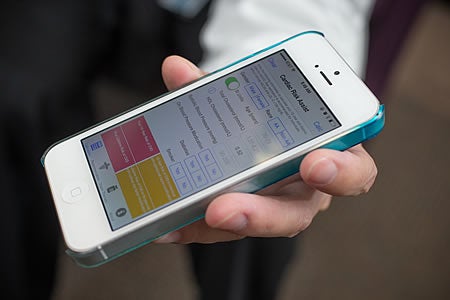App helps doctors teach patients about heart risks
Last fall when the American Heart Association issued new guidelines to help doctors teach their patients about their risks of developing cardiovascular disease – accompanied by a bulky computer spreadsheet calculator — one ECU physician thought he had a better idea.
So he created his own free smartphone app that makes assessing patients’ risk as simple as tapping a screen.
Cardiac Risk Assist is designed by Dr. Tin Nguyen, a second-year internal medicine resident and former computer engineer. It takes the newest risk assessments and recommendations from the American Heart Association, unveiled in November and previously accessible only through the computer spreadsheet, and puts them in an easy-to-use mobile platform.

Dr. Tin Nguyen explains the Cardiac Risk Assist smartphone app he developed. Photos by Cliff Hollis
The app is aimed at primary care physicians to help them explain to patients how changing behaviors, such as stopping smoking or reducing cholesterol, can help them reduce their risk of developing cardiovascular disease. It also recommends whether starting a statin drug will benefit patients and has information about various statins for reference.
Dr. Deepa Kabirdas, an ECU cardiologist and assistant professor, said she and Nguyen were talking about the AHA guidelines and its spreadsheet after the guidelines were released. They agreed the spreadsheet was hard to use.
“I told (Nguyen) ‘I wish there was an app for this,'” she said. “We discussed it in our clinic on Friday, and Monday morning he showed us the preliminary app.”
To create his simpler way for doctors to help their patients, Nguyen bought an Apple laptop computer on a November Friday and taught himself to program it over the weekend. By the following Tuesday, he had finished the app, and he submitted it to Apple’s iTunes app store the next day.
“Trying to get something that’s going to help improve stroke and heart attack outcomes and get it to physicians around the world,” Nguyen said was the motivation for creating the app.
Nguyen made the app free. “If we can improve these things, it’s going to help patients’ lives,” he said. “It’s not about the money. It’s about getting it out and making it accessible.”
Dr. Jennifer G. Robinson, a professor and heart disease specialist at the University of Iowa College of Public Health, is one of the physicians Nguyen consulted while creating the app to get their ideas for making it better, simpler and easier to use.
“Tin’s app is a well-designed, handy, easy-to-use tool that will help doctors better take care of patients,” Robinson said in an email. “The app lets the doctor estimate the risk of heart attack/stroke/death in the next years. Using this information the doctor and the patient can then discuss whether the patient should start a statin to reduce that risk of heart attack/stroke/death. The app is also a memory aid that includes the recommendations from the 2013 (American College of Cardiology)/AHA cholesterol guidelines.”
Nguyen hopes to enter a cardiology fellowship once he completes his residency training. He might also keep making apps.
“Doing little things to make (patients) feel better, it’s very rewarding,” he said.
Cardiac Risk Assist is available for iPhones on the iTunes App Store. A version for Android phones, published by the American College of Cardiology and called the ASCVD Risk Estimator, is available at Google Play. Both are free.

Cardiac Risk Assist